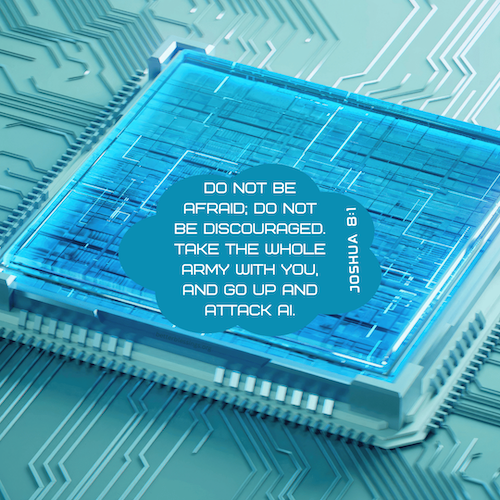Ai in the Bible
The Bible talks about Ai. The biblical reference to Ai is found in the books of Genesis and Joshua in the Old Testament. In these passages, Ai is referenced as a location, a city, near Bethel (meaning house of God.) From Genesis we understand that Abraham, when he was called, built an altar to the Lord between Bethel and Ai. We also know that Abraham, as he grew in wealth and before he separated from Lot, his nephew, settled near Ai. However, what I want to focus on are the passages from Joshua. In these passages, we have the account of Achan and iniquity entering the community of Israel as they were taking possession of the Promised Land thousands of years ago.
Chapters seven and eight of the book of Joshua deal with two subjects: the iniquity of Achan and its effect on the people of Israel and the conquering of the town of Ai by the people of Israel. As the account lays out, Israel has entered the promised land and dispatched the city of Jericho. It was a great victory. The next conquest to consider was the town of Ai. Joshua sent out a scouting party to determine how Ai should be taken, and they came back with a report suggesting that the town was small and only required a part of Israel's army to conquer it. Joshua sent about 3,000 fighting men to conquer Ai, and the people of Ai took them to the woodshed. Israel was seriously defeated.
The Bible talks about a place called Ai. This place was used to teach humans an important lesson.
The defeat devastated Joshua. Israel's leader was in such dismay that he tore his clothes, threw himself to the ground before the Arc of the Covenant, and questioned why God had even brought them across the Jordan in the Promised Land. Remember, this guy had just seen God deliver the walled city of Jericho into the Israelites' hands. God, who seemed a little more than irritated by Joshua's behavior, ordered the leader to "Stand up!" (vs. 10) We discover along with Joshua that the reason for the Jew's *** kicking at the hands of Ai was that there was iniquity in the camp of Israel. Someone had stolen from the devoted things. The devoted things were objects and property devoted to God in worship. They did not belong to anyone. They were God's possession. In today's world, this is similar to donations to the church.
Someone in the Israelite camp had taken some of these things, and the camp was being judged. God instructed Joshua to deal with this iniquity. Joshua immediately did. Verses 14 through 18 of Joshua chapter 7 describe the process used to identify the perpetrator of the act. Through this process, one Achan of the family of Zimri of the clan of the Zerahites of the tribe of Judah was fingered as the culprit. When confronted by Joshua, the accused confessed to stealing several devoted articles, including silver, gold, and a fine robe. The punishment for his actions was very severe. He and his children, along with all of his belongings, including livestock, were stoned and burned, and a heap of stones was piled on top of the lot as a sign.
Thus, the iniquity in the camp was dealt with, and God instructed Joshua to proceed with conquering Ai. Chapter 8 of Joshua describes how the Israelites gained victory over the city of Ai and burned it to the ground. The king of Ai was hung, and then his body was thrown at the gate of the demolished city, and a heap of stones was piled on top of him. Interestingly, the plan for victory required the people of Ai to be overconfident in defeating the Israelites. This is precisely what happened when they saw the Israelites retreating a second time before their army. All the people of Ai left the city and ran after the Israelites. This opened the town to invasion from a hidden, second force of Israelites to enter and thoroughly destroy Ai. The sight of their homes burning was too much for the people of Ai to take, and they literally gave up and were completely annihilated.
This is the account of Ai in the Bible. So why is Ai important in the context of this account. Ai shows us what happens when iniquity is allowed in the camp or sin is permitted in our lives. As God states to Joshua, "That is why the Israelites cannot stand against their enemies; they turn their backs and run because they have been made liable to destruction." (vs. 12) When sin is allowed to remain in our lives, we cannot stand against our enemies. Those who wish to destroy us. Those who stand in the way of us accomplishing all that God has ordained for us. When sin remains in our lives, we are "liable to destruction."
We must deal with iniquity and sin, as did Joshua. Thank the Lord that rectifying such sin is not as severe as what was done to Achan. But still, we must deal with it. We must repent of our sins through Jesus Christ, our Lord and Savior, to be brought into righteousness in Christ. Through this act of repentance and standing in the righteousness God has provided for us, not relenting to temptation, not continuing in sin, we will be cleansed of the iniquity as the camp of Israel was cleansed. And when we go out to face Ai once again, victory will be ours through the power of God and the saving grace of Jesus Christ.

